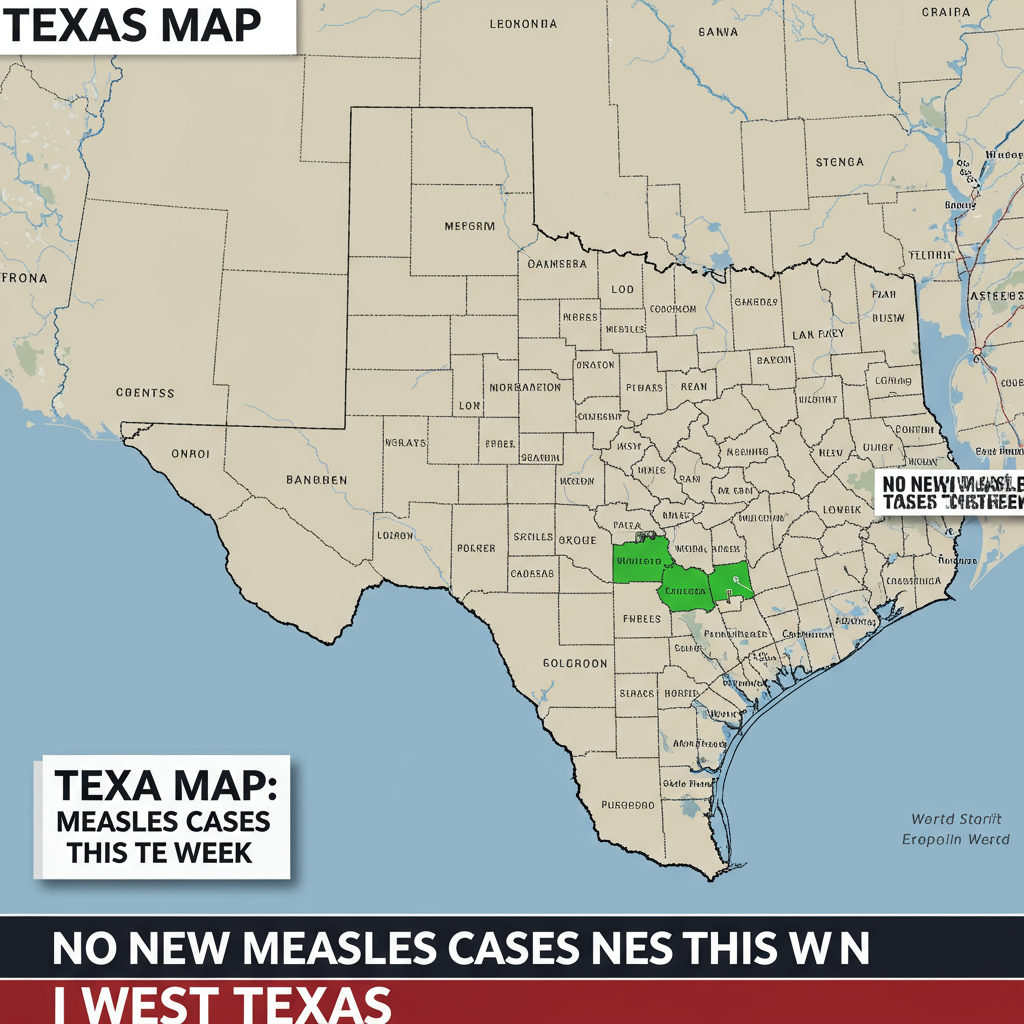West Texas Measles Outbreak Sees No New Cases Reported This Week
Good news emerges from the ongoing measles outbreak in Texas, as state health officials report no new cases directly linked to the significant West Texas cluster over the past week. This pause in new infections within the primary outbreak area marks a hopeful moment, though the state continues to track cases and manage the wider situation.
The Texas Department of State Health Services (DSHS) confirmed in its latest update (as of June 24, 2025) that the total number of cases connected to the West Texas outbreak remains at 750 since it first began in late January. While there was an increase of one hospitalization reported since the previous week, state officials noted this patient was hospitalized earlier in the outbreak timeline. A total of 97 individuals linked to this outbreak have required hospitalization.
This West Texas outbreak stands as the largest single measles outbreak recorded in the United States since the disease was declared eliminated in 2000. Its epicenter is Gaines County, which accounts for over half of the total cases (413). Gaines and Lamar counties are currently designated as “outbreak counties” by DSHS.
Context: Low Vaccination Rates Fuel Outbreak
Health authorities have linked the concentration of cases, particularly in Gaines County, to communities with lower-than-average vaccination rates. Experts emphasize that outbreaks are more likely in areas where vaccination coverage falls below the threshold needed for community protection (often cited as 95% for measles). The tightly-knit Mennonite community around Seminole in Gaines County, which includes many families who homeschool or attend private schools, has been particularly affected. Data from some school districts in the county showed significantly low measles vaccination rates and high conscientious exemption rates in the past year, creating pockets of vulnerability.
Unconnected Cases Reported Elsewhere
While the primary West Texas outbreak saw no new linked cases this week, the state continues to see unrelated measles infections. The latest update noted two new cases not believed to be connected to the West Texas cluster were reported in Dallas and Fannin Counties. Health officials have tracked other scattered measles cases across the state throughout the year that were separate from the main outbreak, with some linked to international travel.
Tragic Toll and Case Demographics
The outbreak has had tragic consequences. Two school-aged children, both unvaccinated and with no known underlying health conditions, have died from measles complications in Texas.
Detailed data reveals who has been affected:
Total Cases (Linked Outbreak): 750 confirmed since late January.
Vaccination Status:
Not Vaccinated / Unknown Status: 707
Vaccinated with One Dose: 22
Vaccinated with Two or More Doses: 21
Note: While a small number of vaccinated individuals have contracted measles, health officials report they generally experience milder illness and are less likely to spread the virus.
Cases by Age Group:
0-4 years: 219
5-17 years: 283
18+ years: 243
Pending Age: 4
Cases by County (Linked Outbreak): While cases span many Texas counties, Gaines County remains the most heavily impacted.
Understanding Measles: Symptoms and Transmission
Measles is a highly contagious respiratory illness caused by a virus. It spreads easily through the air when an infected person coughs, sneezes, or breathes. The virus can linger in the air for up to two hours after an infected person leaves a space.
Symptoms typically appear one to two weeks after exposure and include:
High fever (can reach 105°F)
Cough
Runny nose
Red, watery eyes
Tiny white spots inside the mouth (Koplik spots), appearing 2-3 days after initial symptoms
A characteristic rash that starts on the face and spreads down the body, appearing 3-5 days after other symptoms.
An infected person is contagious for about four days before the rash appears and for four days after. While most people recover, measles can lead to severe complications like pneumonia, brain swelling, and death, particularly in young children, pregnant women, and those with weakened immune systems.
Prevention is Key: The MMR Vaccine
The most effective way to prevent measles is through vaccination. The measles-mumps-rubella (MMR) vaccine, typically given in two doses, is highly effective at protecting against the virus. The first dose is recommended around 12-15 months of age, and the second dose around 4-6 years. Achieving high vaccination rates across communities helps protect those who cannot be vaccinated, such as infants and individuals with certain medical conditions, through “herd immunity.”
Declining childhood vaccination rates in Texas and nationally have raised concerns among public health officials, making populations more vulnerable to outbreaks.
If You Suspect Measles Exposure or Infection
If you think you or your child has measles, or if you’ve been exposed to someone with measles, it’s crucial to isolate yourself from others immediately. Call your healthcare provider before visiting a clinic or hospital so they can make arrangements to see you without potentially exposing others in the waiting area. Review your and your family’s vaccination records and discuss any concerns with your doctor.
During an outbreak, Texas regulations (TAC Rule §97.7) require schools and childcare settings to exclude unimmunized children for at least 21 days after their last known exposure to a measles case to prevent further spread.
State and local health agencies have been actively involved in contact tracing, recommending isolation for unvaccinated exposed individuals, and providing vaccination clinics in affected areas. The significant cost of managing and responding to measles outbreaks highlights the far greater value and cost-effectiveness of preventing the disease through vaccination.
While the current update brings a moment of relief with no new cases in the main West Texas outbreak area this week, health officials continue to monitor the situation closely and urge Texans to ensure they are up-to-date on their MMR vaccinations as the best defense against this highly contagious and potentially deadly disease.




